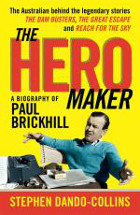The hero maker: A biography of Paul Brickhill by Stephen Dando-Collins

Penguin Random House, 2016. ISBN 9780857988126
(Age: Secondary) Subtitled: 'the Australian behind the legendary
stories The dam busters, The great escape and Reach
for the sky'. As the daughter of a Lancaster wireless
operator/air gunner growing up in the Sydney suburbs one of my
favourite spots in our house was in front of our fireplace which had
built-in bookshelves on either side. My father was a voracious
reader and Paul Brickhill's books were among his favourites. I had
also consumed them all by the time I was 12 and returned to them
many times over the years. Now those same copies reside on my own
bookshelf.
Having been raised on such a steady diet of Brickhill and knowing
that my father had (at some stage) been acquainted with him (who
knows where?), it would be reasonable to expect that I might have
had some knowledge of the man's life. The only thing I've ever known
was that he was a journalist.
Thanks to this wonderful biography, which I have also devoured as
greedily as I did the man's books, I now have a much greater
awareness of this hugely successful writer and his often troubled
life.
Because I urge you to read this for yourself (I could almost
impatiently stamp my foot and say 'you must'!) there is no need for
much detail regarding the content. Dando-Collins takes us on the
full journey of Brickhill's life including some background history
regarding his family's involvement with newspapers. He describes the
young Paul's childhood on the North Shore of Sydney and his meeting
with a solitary unkempt boy of similar age named Peter Finch who
became a lifelong friend. An uninspired school experience led to
some unfulfilling jobs until Brickhill gained a foothold in the
newspaper business which was his heritage, rising quickly through
the ranks from copyboy to journalist. Despite enjoying some
accolades for his work Paul felt in need of a new challenge and
adventure and decided to realise his childhood dream of flying by
joining the RAAF (despite initial disdain of enlisting). Before too
long he was a fully-fledged Spitfire pilot and on combat missions
but was shot down near Tunis narrowly escaping death as he abandoned
his 'kite' and was captured by Italians who of course promptly
handed him over to the Germans. There followed a long stint in
Stalag 3 which Paul was later to make famous - or infamous - as the
setting for The great escape (RIP The Fifty). Although an integral
member of the X Organisation Brickhill was not among the escapees
and at the close of war was force marched across Germany with other
POWs along with retreating German troops and refugees. Returning to
civilian life after the trauma and privations of POW existence was
not easy for many survivors, Paul among them, but his determination
to tell the story of the great escape and honour his comrades drove
him to complete his first 'escape' book. Almost ten years later,
with other escape books, The dam busters and (what I still regard
as) his 'tour de force' Reach for the sky, the biography of Douglas
Bader, Brickhill was celebrated around the world for both books and
screen adaptations as well as journalistic pieces.
The rigours of the war were not the stuff of easy and calm futures
and Paul's tempestuous and tumultuous marriage to young model Margot
eventually collapsed into catastrophe. This is a no kid gloves account
of Brickhill's personal life. His unpredictable moods and tempers
(including striking his wife on a number of occasions), the
depression, mental illness, heavy drinking and reclusiveness are all
revealed. When his marriage finally faltered it seemed that so did
Paul's creativity and though he 'worked' on several projects over
the next two decades, he more or less lived rather like a hermit in
his small top floor unit in Balmoral, Sydney, without ever
publishing again.
Some critics have dismissed Brickhill's work as being too
'journalistic' but I will say I have never enjoyed reading
newspapers and the like, but I love reading Brickhill. If their
comments refer to the fact that he employs his skills of
journalistic details and observation, yes he does. But he also has a
deft touch for laconic humour and the ability to weave facts into a
cracking yarn. For me the absolute joy of this book was that
Dando-Collin's literary style appears to echo the very essence of
the subject's own work and at times I could 'hear' Brickhill's voice
telling his own story in his own words.
I am so grateful to Random House Australia for allowing me the
privilege of reading and reviewing this volume. I am also grateful
to Stephen Dando-Collins who has breathed life again into one of the
integral storytellers in my life. How fitting in 2016, the 100th
anniversary of his birth and 25th anniversary of his death that Paul
Brickhill's skill and story can be brought to a new generation of
readers and this tribute which is a testament to his global acclaim
is both perfect and poignant.
If you have secondary students who are keen on biographies I suggest
this would be a valuable addition to your collection but above all,
as an Australian reader, I highly recommend it to you to celebrate
the life of one of our most widely recognised writers.
Sue Warren